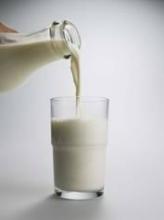Milk consumption was associated with a slowing of the structural progression of knee osteoarthritis among women who participated in the longitudinal Osteoarthritis Initiative study.
From a group of 4,796 adults aged 45-79 years with established knee OA or major risk factors for OA who had been enrolled in the study in 2004, Dr. Bing Lu of the division of rheumatology, immunology, and allergy at Brigham and Women’s Hospital and Harvard Medical School, Boston, and his associates identified 2,148 of these adults with 3,064 affected knees. They followed the patients using annual plain radiographs at 1, 2, 3, and 4 years after enrollment.
The investigators measured changes in joint space width between the medial femur and tibia to quantify OA progression, as well as Osteoarthritis Research Society International grading as a semiquantitative measure of progression. Milk consumption and intake of dairy products, other foods, and dietary supplements were assessed with a food frequency questionnaire.
Among women only, a significant inverse dose-response relationship was found between milk intake and the rate of decline in joint space width, beginning at the relatively low "dose" of seven or fewer glasses of milk per week. Every increase of 10 glasses per week was associated with 0.06 mm less decline in joint space width over 48 months, compared with women who drank no milk.
This association remained robust after the data were adjusted to account for alcohol consumption and the intake of cheese and yogurt, and it was not affected by the participants’ race, smoking status, level of physical activity, vitamin D intake, and the presence or absence of obesity. A sensitivity analysis that accounted for dietary calcium intake reduced the effect of milk consumption in women by 25% (Arthritis Care Res. 2014 April 7 [doi: 10.1002/acr.22297]).
The reason for this association remains unclear, and it also isn’t known why milk intake didn’t correlate with OA progression in men. Moreover, causality has not been established because this was an observational study and the participants were not randomized to consume different quantities of milk, Dr. Lu and his associates wrote.
This study was supported by the National Heart, Lung and Blood Institute. The Osteoarthritis Initiative is a public-private partnership funded by the National Institutes of Health, Pfizer, Novartis, Merck, and GlaxoSmithKline. Dr. Lu and his associates reported no financial conflicts of interest.


